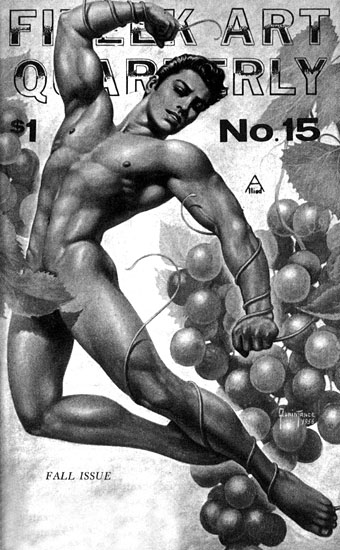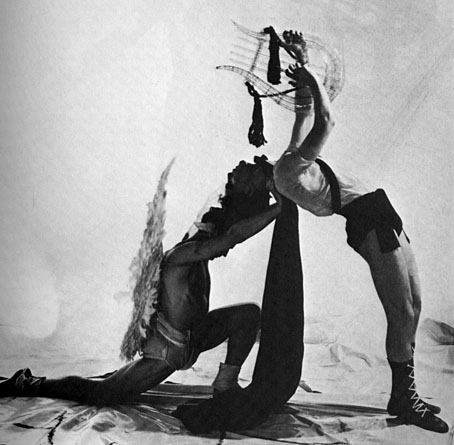The Silver Hero.
One of a number of homoerotic works by this Russian artist, very similar in places to George Quaintance. Oh, and with swords, of course…
Elsewhere on { feuilleton }
• The gay artists archive
• The men with swords archive
A journal by artist and designer John Coulthart.
The Silver Hero.
One of a number of homoerotic works by this Russian artist, very similar in places to George Quaintance. Oh, and with swords, of course…
Elsewhere on { feuilleton }
• The gay artists archive
• The men with swords archive
The Crusader by George Quaintance (1943).
Continuing an occasional series, I was hoping to find the original photo which George Quaintance used as a model for this painting but failed dismally. I did find the photo below, however, a piece of Roman camp by beefcake photographer Alonzo Hanagan, aka ‘Lon of New York’ on this Boy Culture post where Hanagan is interviewed about his work.
Elsewhere on { feuilleton }
• The men with swords archive
• The gay artists archive

Baccant (1956) by George Quaintance.
Fizeek Art Quarterly was an American magazine of gay art and erotica which ran for 26 issues from 1961 to 1969. Artists included Tom of Finland and—as can be seen above—George Quaintance. The Fizeek Art Weblog continues the tradition of the magazine by posting extracts from old issues as well as more contemporary material (below) in a similar vein. “Vein” is perhaps an apt choice of description given the quantity of tumescent penises on display. Most of the images are quite gleefully hardcore (and often deliciously silly with it); as usual, if that’s not your thing then don’t look. Perfectly fine for the rest of us, however.
Virgo by Kit.
Elsewhere on { feuilleton }
• The gay artists archive
Previously on { feuilleton }
• Let’s get physical: Bruce of Los Angeles and Tom of Finland
• Philip Core and George Quaintance
Edgar Hayes (Beach) (1957).
Bruce of Los Angeles is a new exhibition of beefcake photos from the Fifties and Sixties at Wessel + O’Connor, NYC, which opens today and runs until December 20, 2008. Bruce’s name is a very familiar one to aficionados of physique photography and I imagine some of these prints will be pretty familiar too. There’s a couple of guys with swords among the selection but as a break from that particular obsession I picked out cutie Edgar Hayes instead.
Born Bruce Bellas in 1909, he was a chemistry professor from Nebraska who would wind up in Los Angeles as the top “Beefcake” photographer of the 1950’s.
He started out there in the 1940’s, shooting bodybuilding contests and met many of his models while working for Joe Weider’s muscle magazine empire, which chronicled the physical culture movement sweeping across America following WWII. Bellas photographed some of the most important figures of this era; bodybuilders Steve Reeves, Ed Fury, and George Eiferman, as well as models such as Joe Dallesandro, Mark Nixon, and Brian Idol.
Physique Pictorial cover by Tom of Finland (1961).
Meanwhile, and a bit closer to home for me, the Contemporary Urban Centre in Liverpool has been running an exhibition of drawings by Tom of Finland, another very familiar name in the world of gay art and erotica. Twenty-five works are on display there until November 30th.
• From Finland with lust | Mark Simpson looks at the artist’s legacy
Elsewhere on { feuilleton }
• The gay artists archive
Previously on { feuilleton }
• Philip Core and George Quaintance
The Flandrin pose again, this time in a photograph by George Platt Lynes (1907–1955). This is from a Flickr set of Lynes’ work which was a nice find since many of the web collections are small and tend to repeat the same material.

The picture above isn’t from the Flickr set, it’s a scan from Philip Core’s essential Camp: The Lie that Tells the Truth (1984), and a photograph that long fascinated me for completely unwholesome and inartistic reasons. Core credits it only as depicting dancers from Balanchine’s Icarus but I’d suspected for some time it was a Lynes picture, Lynes having photographed Balanchine’s dancers on several occasions, notably in some nude stagings of Orpheus. The Flickr picture below confirms the Lynes origin although it adds a new layer of mystery by crediting it to Balanchine’s Die Fledermaus. Given the very Classical look of the dancers’ costumes I suspect Core has the correct attribution but the confusion is also an excuse to keep searching.
Elsewhere on { feuilleton }
• The recurrent pose archive
Previously on { feuilleton }
• Philip Core and George Quaintance
• George Platt Lynes